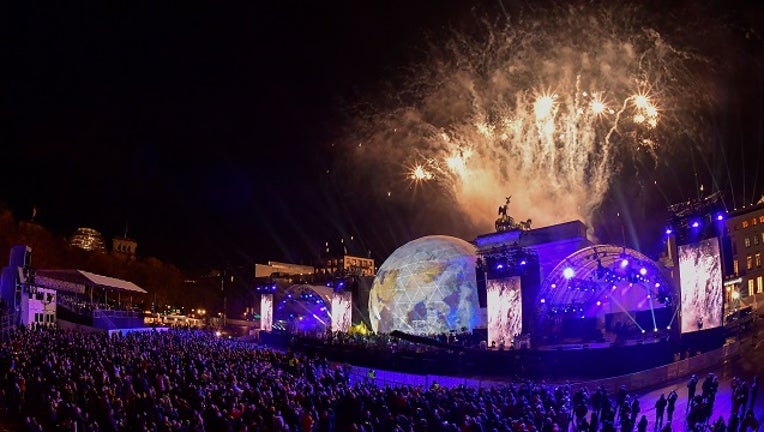Germany, allies mark 30 years since the fall of the Berlin Wall

Fireworks are seen during the public show for the 30th anniversary of the fall of the Berlin Wall, on November 9, 2019 at the Brandenburg Gate in Berlin. Germany on Saturday celebrates 30 years since the fall of the Berlin Wall ushered in the end of ((Photo by Tobias SCHWARZ / AFP) (Photo by TOBIAS SCHWARZ/AFP via Getty Images))
BERLIN (AP) - Germany marked the 30th anniversary Saturday of the opening of the Berlin Wall, a pivotal moment in the events that brought down Communism in eastern Europe.
Leaders from Germany, Poland, Hungary, Slovakia and the Czech Republic attended a ceremony at Bernauer Strasse -- where one of the last parts of the Berlin Wall remains -- before placing roses in the once-fearsome barrier that divided the city for 28 years.
"The Berlin Wall, ladies and gentlemen, is history," German Chancellor Angela Merkel said later at a memorial service inside a small chapel near where the Wall once stood. "It teaches us: No wall that keeps people out and restricts freedom is so high or so wide that it can't be broken down."
Noting the cruelty of the East German regime -- which had torn down a previous church on the former death strip site so snipers could get a better shot at people fleeing to the West -- Merkel paid tribute to those who were killed or imprisoned during the Communist dictatorship and insisted that the fight for freedom worldwide isn't over.
"We are bereft of excuses, challenged to do our part for freedom and democracy," she said.
In a statement issued by his office, U.S. President Donald Trump congratulated Germany on its anniversary, saying that "courageous men and women from both East and West Germany united to tear down a wall that stood as a symbol of oppression and failed socialism for more than a quarter of a century."
"The United States and our allies and partners remain steadfast in our unwavering allegiance to advancing the principles of individual liberty and freedom that have sustained peace and spawned unparalleled prosperity," he added.
Speaking to European leaders at Bernauer Strasse, head of the Berlin Wall memorial site, Axel Klausmeier, recalled the images of delirious Berliners from East and West crying tears of joy as they hugged each other on the evening of Nov. 9, 1989.
The collapse of the Berlin Wall was brought about largely by peaceful protests and a stream of people fleeing East Germany that piled pressure on the country's Communist government to open its borders to the West and ultimately end the nation's post-war division.
Thirty years on, Germany has become the most powerful economic and political force on the continent, but there remain deep misgivings among some in the country about how the transition from socialism to capitalism was managed.
German Chancellor Angela Merkel acknowledged this in a recent interview with daily Sueddeutsche Zeitung, saying that "with some things, where one might have thought that East and West would have aligned, one can see today that it might rather take half a century or more."
She also recalled that Nov. 9 remains a fraught date in German history, as it also marks the anniversary of the so-called Night of Broken Glass, an anti-Jewish pogrom in 1938 that foreshadowed the Nazi's Holocaust.
Light installations, concerts and public debates were planned throughout the city and other parts of Germany to mark the fall of the Wall, including a concert at Berlin's iconic Brandenburg Gate.
Among those who had come to Berlin to celebrate were members of the Trabant Club Middle Hesse, an association that promotes the old East German car affectionately known as the Trabi.
Jens Schmidt, who fled East Germany before the fall of the Wall by driving his Trabi to Hungary and then across the open border to the West, said the club has many young members for whom learning to repair the simple but sturdy vehicles can be a lesson in history and civics, too.
"The team spirit," he said. "It was stronger back then."

